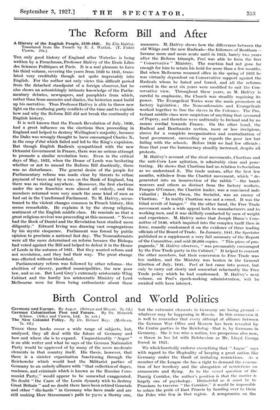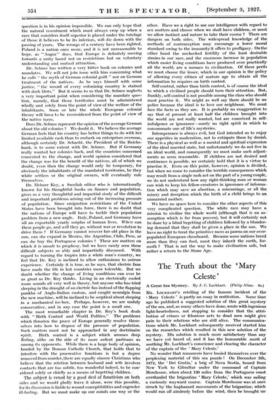Birth Control and World Politics
THESE three books cover a wide range of subjects, but, analysed, they all deal with the future of Germany and how and where she is to expand. Unquestionably "Augur" is an able writer and what he says of the German Nationalist Party would be approved of by many of the more moderate elements in that country itself. His thesis, however, that there is a sinister organization functioning through the Reichswehr which would lead the Militarist parties of Germany to an unholy alliance with "that collection of dupes, madmen, and criminals which is known as the Russian Com- munist Party," would appear to be somewhat exaggerated.
No doubt " the Czars of the Lenin dynasty wish to destroy Great Britain " and no doubt there have been retired Generals and other " die-hards " in Germany who have made and are still making Herr Stresemann's path to Qwee a thorny one, but the extremist elements in Germany arc losing ground— whatever may be happening in Russia. In this connexion it is well to remember that every attempt at alliance between the German War Office and Moscow has been revealed by the Centre parties in the Reichstag—that is, by Germans in Germany. She is too wise a nation, too prosperous also now, o throw in her lot with Bolshevism as Mr. Lloyd George feared in 1921.
We wholeheartedly endorse everything that "Augur" says with regard to the illogicality of keeping a great nation like Germany under the thrall of irritating restrictions. As a member of the League she has a right to demand the evacua- tion of her territory and the abrogation of restrictions on armaments and flying. As to the vexed question of the Danzig Corridor, the author's position is that the matter is largely one of psychology. Distasteful as it must be to Prussians to traverse " the Corridor," it would be impossible to solace the pride of East Prussia by handing over to them the Poles wire live in that region. A compromise on the
question is in his opinion impossible. We can only hope that the natural resentment which must always crop up when a race that considers itself superior is placed under the tutelage of those it believes to be its inferiors, will die down with the passing of years. The wrongs of a century have been righted. Poland is a nation once more, and it is not unreasonable to hope, as "Augur" does, that Europe is definitely moving towards a unity based not on restrictions but on voluntary understanding and mutual attraction.
Dr. Schnee has written a very bitter book on colonies and mandates. We will not join issue with him concerning what he calls the myth of German colonial guilt " nor on German treatment of the natives. As he says himself with some justice, " the record of every colonizing country is stained with dark blots." But it seems to us that Dr. Schnee neglects a very important point when considering the mandate ques- tion, namely, that those territories must be administered wholly and solely from the point of view of the welfare of the inhabitants. Soon or late the whole European colonial theory will have to be reconsidered from the point of view of the native races.
Does Dr. Schnee represent the opinion of the average German about the old colonies ? We doubt it. We believe the average German feels that his country has better things to do with her limited available cash than to embark on enterprises overseas, although certainly Dr. Schacht, the President of the Reichs- bank, is to some extent with Dr. Schnee. But if Germany really wanted her colonies back, and the countries concerned consented to the change, and world opinion considered that the change was for the benefit of the natives, all of which we doubt, even then the change would only be temporary, for obviously the inhabitants of the mandated territories, be they white settlers or the original owners, will eventually rule themselves.
Dr. Helmer Key, a Swedish editor who is internationally known for his thoughtful books on finance and population, gives us a very thoughtful and impartial study of the difficult and important problems arising out of the increasing pressure of population. Since emigration restrictions of the United States have been brought into force, there is no doubt that the nations of Europe will have to tackle their population problem from a new angle. Italy, Poland, and Germany have all an exportable yearly surplus of human lives. Where can these people go, and will they go, without war or revolution to drive them ? If Germany cannot recover her old place in the sun, can she expand in Mexico, the Argentine, Chile, Peru, or can she buy the Portuguese colonies ? These are matters on which it is unsafe to prophesy, but we have rarely seen these difficult subjects so ably and impartially discussed. With regard to turning the tropics into a white man's country, we feel that Dr. Key is inclined to allow enthusiasm to outrun experience. Certainly it is true, as he says, that electric fans have made the life in hot countries more tolerable. But we doubt whether the change of living conditions can ever be as great as Dr. Key thinks. Living in an electrically cooled room sounds all very well in theory, but anyone who has tried sleeping in the draught of an electric fan instead of the flapping punkha of Anglo-Indian custom, and caught neuralgia from the new machine, will be inclined to be sceptical about sleeping in a mechanical ice-box. Perhaps, however, we are unduly conservative, and in any case the point is a small one.
The most remarkable chapter in Dr. Key's book deals with " Birth Control and World Politics." The problems which threaten the peace of Europe generally resolve them- selves into how to dispose of the pressure of population. Such matters must not be approached in any doctrinaire spirit. Birth control is a subject which arouses deep feeling, alike on the side of its more ardent partisans as among its opponents. While there is a large body of opinion, headed by the Roman Catholic Church, that holds that to interfere with the procreative functions is but a degree removed from murder, there are equally sincere Christians who believe that the relation between husband and wife involves contacts that are too subtle, too wonderful indeed, to be con- sidered solely or chiefly as a means of begetting children.
The subject is vexed by a good deal of fanaticism on both sides and we would gladly leave it alone, were this possible, for its discussion is liable to wound susceptibilities and engender ill-feeling. But we must make up our minds one way or the
other. Have we a right to use our intelligence with regard to sex matters and choose when we shall have children, or must we allow instinct and nature to take their course ? There are dangers on both sides. The widespread knowledge of the methods of contraception may encourage a lower moral standard owing to the immunity it offers to profligacy. On the other hand the unchecked fertility of the least desirable strains in our race, and the enormous increase in population which easier living conditions have produced over practically all the world, are a menace to civilization. Of these perils we must choose the lesser, which in our opinion is the policy of allowing every citizen of mature age to obtain all the information he requires on birth control.
Self-control, rather than birth control, is Of course the ideal to which a civilized people should turn their attention. But, frankly, self-control is not possible among the class who should most practise it. We might as well say there should be no police because the ideal is to love our neighbour. We must face the facts as they are. It is probably no exaggeration to say that at present at least half the children brought into the world arc not really wanted, but are conceived in self- indulgence or ignorance—surely no right spirit in which to consummate one of life's mysteries.
Intemperance is always evil, but God intended us to enjoy our appetites in moderation, not to extirpate them by denial.
There is a physical as well as a mental and spiritual expression of the ideal married state, but unfortunately we do not live in an ideal world, and consequently we must make such adjust- ments as seem reasonable. If children are not desired and continence is possible, we certainly hold that it is a virtue to practise it. Even on this point, however, opinion is divided, but when we come to consider the terrible consequences which may result from a single rash act on the part of a young couple, we do not understand how any right-thinking man or woman can wish to keep his fellow-creatures in ignorance of informa- tion which may save an abortion, a miscarriage, or all the misery and deception which the birth of a child brings to an unmarried mother.
We have no space here to consider the other aspects of this very complicated question. The white race may have a. mission to civilize the whole world (although that is an as- sumption which is far from proven), but it will certainly not be done by a blind begetting of children followed by a blunder- ing demand that they shall be given a place in the sun. We have no right to treat the primitive races as pawns on our over- populated European chessboard. Because some nations breed More than they can feed, must they inherit the earth, for- sooth ? That is not the way to make civilization safe, but rather a return to the Stone Age.











































 Previous page
Previous page